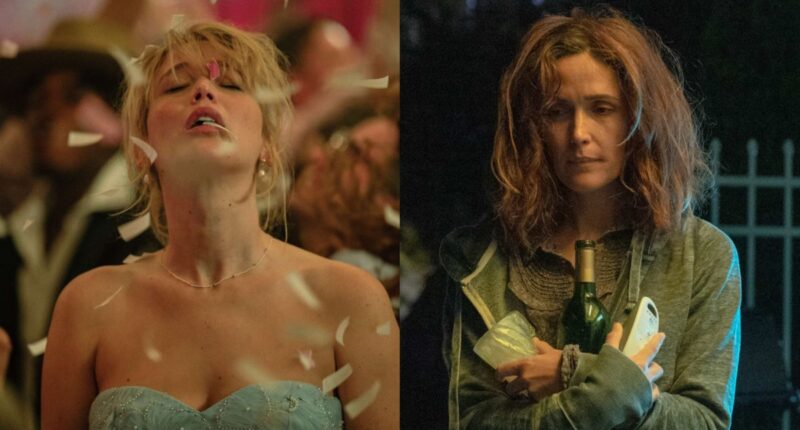The approach gives Lawrence a mountain of material to work with, and she makes it ring true when Grace says that the only thing in her life she comes to love, in spite of the title, is her son. “He’s perfect.” And yet throughout the movie, one gets the strong sense she never had much of a vote in when or where he would be born, and with what support system. Jackson’s childhood friends and family ostensibly become Grace’s, but she goes from missing the initial carnality of their relationship—even snarking “you don’t bore me,” when he complains about her not stargazing with him, “it’s fucking everything else”—to outright resenting a man who claims he is always tired, even as he keeps a handful of condoms in his glove compartment.
As the director of You Were Never Really Here and We Need to Talk About Kevin, Ramsay is a veteran of the slow-burn and introspective character studies. And there is a lot of character for both Lawrence and Pattinson to play. Strangely though, they remain as distant as the starlight seems to Grace on that glassy night with a telescope. Everything is remote and broken. That is of course how the pair let their marriage deteriorate, and perhaps how Grace feels about everyone in her life save the child she comes to idolize, but for a film attempting to insert us into the interiority of a mother’s struggles, we nor her film ever fully internalize Grace’s point-of-view or the anxieties that ail her. Despite the movie being told through her eyes, what lies behind them remains an abstraction. Die makes the pretense of trying to help, yet a lot like the characters onscreen fails to connect with the crisis at hand.
Fortunately, Die, My Love is not the only film eager to meet the regressive cultural moment where “trad wife” hashtags and sensibilities attempt to squeeze women back into kitchens. In the last 18 months, we’ve had Amy Adams and Marielle Heller’s Nightbitch, which is a lot more conventional than that title might suggest, not to mention a pair of nun-sploitation horror movies about forced pregnancy. Of the two, it is the piece of IP extension, The First Omen, which turned out to be radically impassioned statement thanks to thrilling direction by Arkasha Stevenson and a bold performance from Nell Tiger Free.
Almost all of these pictures are from women directors intent on dragging the cinematic language around motherhood away from iconography associated with domestic simplicity or a sense of generational conformity. The best one, however, might be another flirtation with surreality and allegory that just entered wide release last week: Mary Bronstein’s If I Had Legs I’d Kick You.
The A24 release stars Rose Byrne as Linda, a mother who supposedly has her life together as a successful therapist and in a loving home with her daughter (Delaney Quinn) and husband Charles (Christian Slater). Except that Charles is almost entirely off-screen, a warm if distracted voice on an iPhone as he attempts to humor his wife while working as a captain on a cruise ship. Meanwhile the aforementioned daughter is technically onscreen, but her face is never seen, nor her name uttered.
Instead this child with an undisclosed medical condition is simply a source of wants, pleads, and cries; a babe who can articulate she desires a hamster right now, or that she is hungry, but otherwise seems to offer nothing but burden and guilt to a mother who also must deal with the fact that they have to abscond to a sketchy motel after their house floods due to a burst pipe.

![Tubi and Kickstarter's Groundbreaking Initiative Unveils 3 Must-See Indie Movie Trailers [Exclusive]](https://citigist.com/wp-content/uploads/2025/11/Tubi-and-Kickstarters-Groundbreaking-Initiative-Unveils-3-Must-See-Indie-Movie-200x110.jpg)







